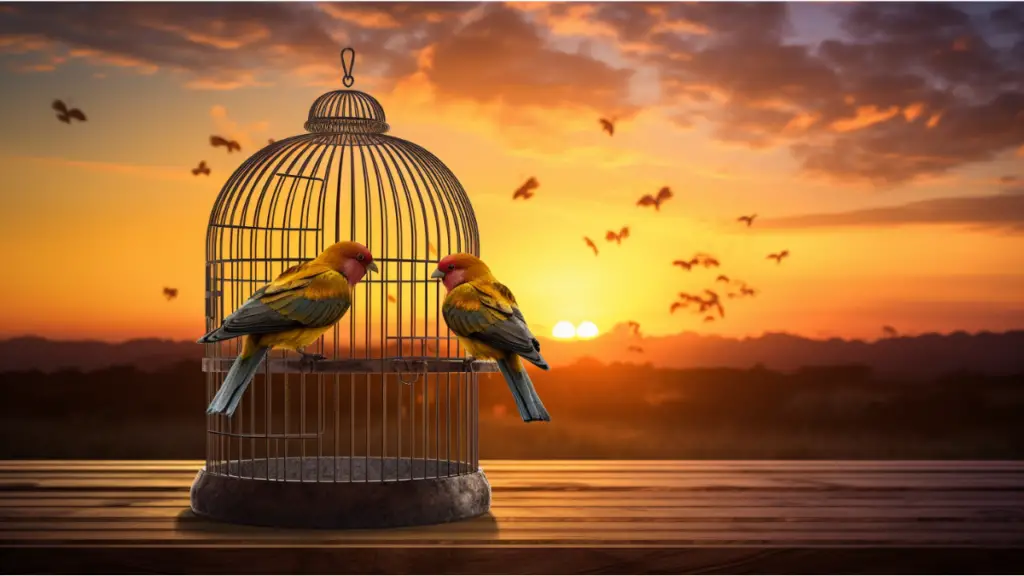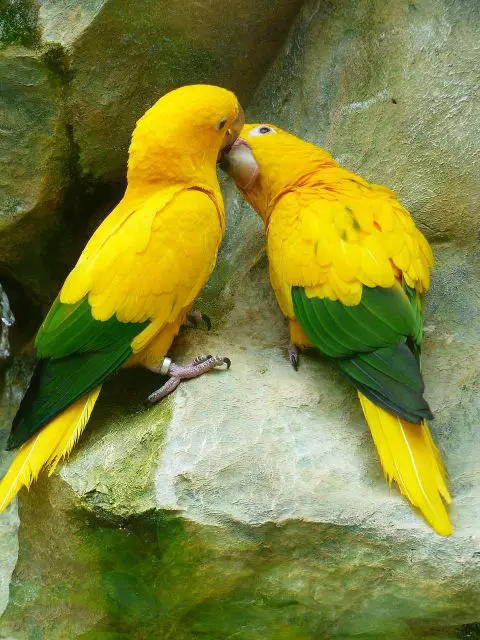You’re a proud lovebird owner. You adore their colorful feathers and chirpy nature. But, a question often nags at the back of your mind: ‘How long can lovebirds be left alone?’
This query isn’t just about ensuring they have enough food and water; it’s about their need for companionship. Lovebirds can’t be left alone for long periods because they require daily interaction with their human friends to stay happy and healthy.
Finding someone who can or considers boarding options is essential if you cannot provide this. Your feathered friend’s well-being depends on your commitment and dedication.
Let’s delve into understanding your lovebird’s needs, the importance of human interaction, the potential risks of prolonged solitude, finding a caretaker, and exploring boarding options.
- Key Takeaways
- Understanding Lovebird Needs
- Importance of Human Interaction
- Potential Risks
- Finding a Caretaker
- Boarding Options
- Frequently Asked Questions
- Can lovebirds be trained to be alone for longer periods of time?
- Are certain breeds of lovebirds more independent than others?
- What are signs that a lovebird is experiencing stress or loneliness?
- How can technology (like pet cameras) help monitor lovebirds when left alone?
- Can lovebirds form bonds with other pets, and can this help them cope with being alone?
- Conclusion
Key Takeaways
- Lovebirds should not be left alone for extended periods of time as they require daily interaction and attention from humans for their happiness and well-being.
- Leaving lovebirds alone can result in behavioral changes, loneliness, and difficulties with socialization and bonding.
- Lack of mental stimulation and socialization can lead to wild behavior and health risks in lovebirds.
- When planning to be away, finding a reliable caretaker or considering boarding options that can provide proper care, attention, and socialization for lovebirds is important.
Understanding Lovebird Needs
Understanding your lovebird’s needs is crucial to their well-being. They can’t be left alone for long periods without reverting to a wild state. This affectionate species has high socialization needs. They require daily interaction and emotional bonding to keep their spirits up. Pay attention to their communication cues and any behavioral changes, as they might indicate loneliness effects.
Interactive toys and training methods can provide mental stimulation but can’t replace your company. Your lovebird’s playtime requirements aren’t just about physical activity. They’re also about quality time with their favorite human. Remember, their affectionate nature means they need more than just food and water. They need you.
So, plan accordingly and ensure your lovebird never feels neglected.
Importance of Human Interaction
It’s crucial to remember that these feathered friends require our attention and affection daily, without which they can quickly return to their wild behaviors. Your lovebird thrives on social bonding and mental stimulation, which only you can provide.
Here’s a table to help you better understand your role:
| Activity | Benefits | Tips |
|---|---|---|
| Socialization Skills | Enhances trust building exercises | Allow your lovebird to interact with others |
| Playtime Activities | Promotes emotional well-being | Create a fun and safe environment |
| Communication Cues | Supports behavioral development | Learn to understand your lovebird’s signals |
Remember, your role in preventing loneliness and creating a strong bond with your lovebird is vital. This interaction is key to their happiness and health.
Potential Risks
Potential risks should not be underestimated; they can seriously affect your feathered friend’s life. Leaving your lovebird alone can result in behavioral changes and profound feelings of loneliness. Abandonment issues can lead to emotional distress, causing difficulties with socialization and even separation anxiety. Additionally, a lovebird may exhibit wild behavior if it lacks mental stimulation, which can pose health risks if the bird does not eat or drink properly.
Prolonged solitude can also lead to trust and bonding issues, making it more challenging to reconnect with your pet. Therefore, when considering how long to leave your lovebird alone, it is crucial to be aware of these dangers. Remember, they rely on you for their well-being, so prioritizing their care is essential.

Finding a Caretaker
Finding a trustworthy person to look after your feathered friend when you’re not around is crucial to prevent the negative effects of solitude.
Start by finding reliable caretakers. Ask friends for help or consider neighbors or family members who may be willing. Hiring professional pet sitters is another excellent option. Check local pet boarding facilities or research online pet-sitting services if that isn’t possible.
Whatever your choice, ensure the caretaker has experience with lovebirds. Set up a lovebird care schedule and provide detailed instructions to caretakers to meet your bird’s needs. Regularly checking in with the caretaker is vital, as it creates a sense of accountability. Remember, you’re entrusting them with your precious lovebird’s well-being.
Boarding Options
When you’re jetting off for a vacation, there’s no need to fret about your feathered pal – boarding options are plentiful and can provide top-notch care for your chirpy companion.
- Home vs. professional boarding: A professional facility might offer more comprehensive care, especially for lovebirds with special needs. Alternatively, home boarding can provide a familiar environment.
- Cost and time for boarding: These factors will vary, so it’s good to search for ‘boarding facilities near me’ to compare options.
- Boarding requirements and preparation: Most facilities require health checks for lovebirds. Prepare your lovebirds by gradually acclimating them to the new environment.
Consider boarding options for multiple lovebirds, or weigh boarding vs. a pet sitter. Whatever you choose, remember these tips for a smooth transition during boarding.

Frequently Asked Questions
Conclusion
So, remember, your lovebird can’t be left alone for long. They crave daily interaction to stay happy and healthy. If you can’t provide this, finding someone who can or can explore boarding options is crucial.
Taking care of a lovebird is a big commitment, but seeing them thrive is worth it. A well-cared-for lovebird is a joy to have around.
